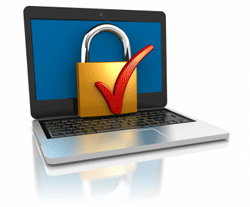
Trying to remember all of your passwords can be time consuming. Some need capitals, numbers and symbols, while others require a certain amount of characters. It’s so much simpler for the average consumer to have the same 2 or 3 passwords that they can remember. But when you’re using them online regularly, to make purchases, retrieve email or handle your banking, you put yourself at great risk. If one of these sites gets hacked, not only can the hackers retrieve your credit card info, they also get their hands on your name and passwords. Not only can they use that valuable information, they can sell it to other people via the internet. They can also use your email list to send malicious messages to all the recipients. It’s a much larger and more complicated fiasco than you thought, isn’t it?
Hackers know that the public is generally lazy about their variety of passwords and how often they update them. Here are some tips to show them otherwise:
Fact: Weak passwords are no challenge for strong viruses
Fact: Hackers have databases of over a billion passwords – that’s right, over one billion – they can run through to try and match yours. Suddenly having 4 or 5 doesn’t seem like so much.
The time it will take you to create more passwords is much less than the time it will take to repair, if possible, the costly damage viruses and hackers can cause by accessing your information.